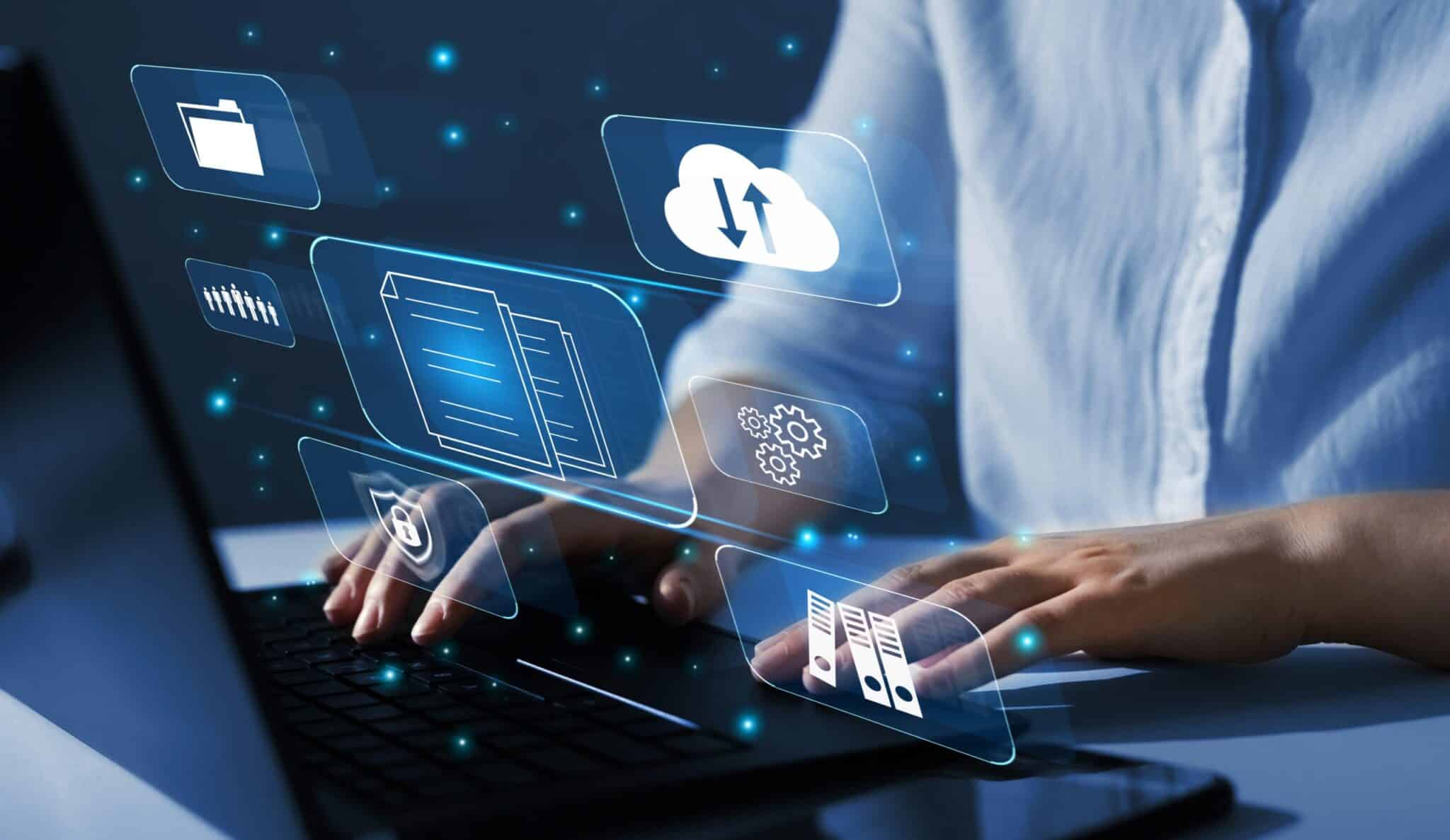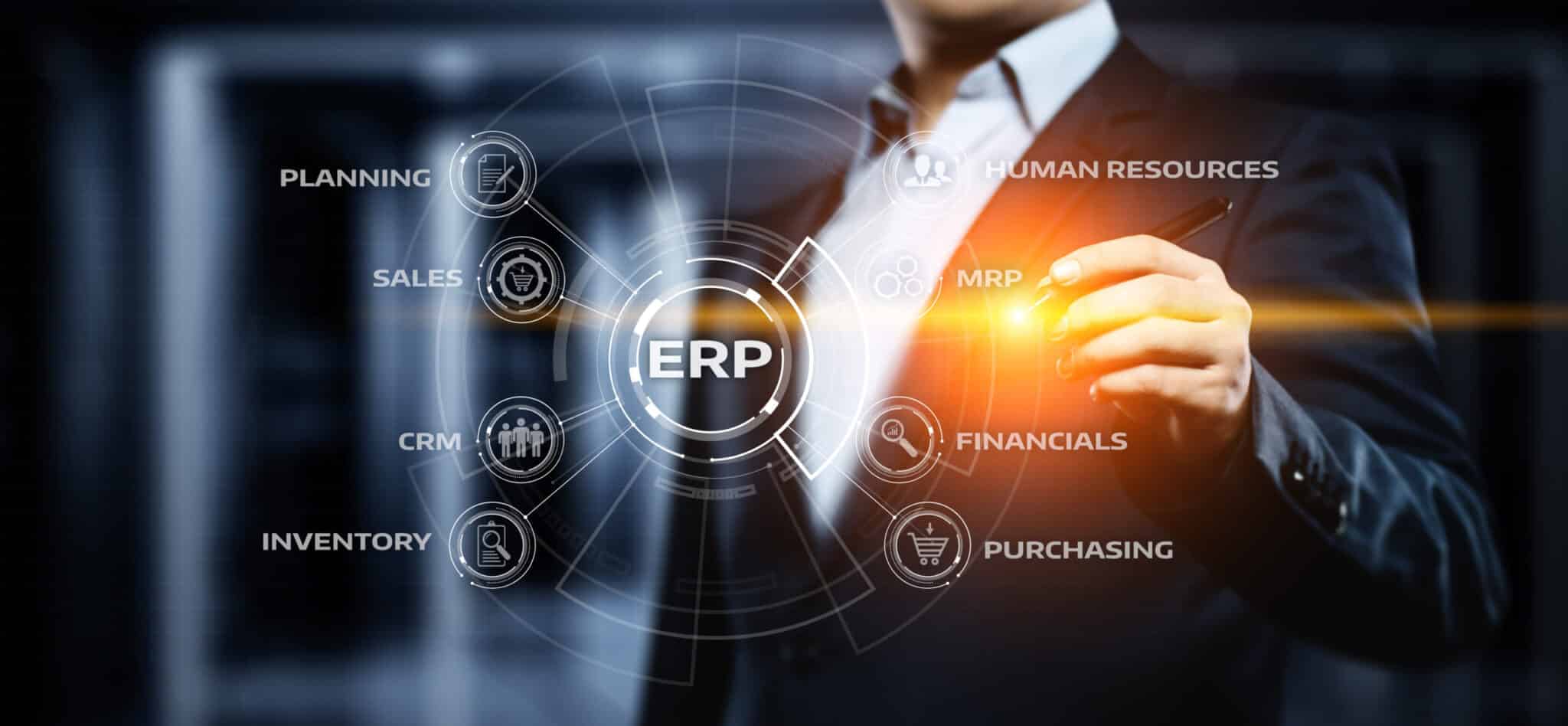Enterprise resource planning, or ERP, is a system that allows businesses to manage their resources effectively.
It can help with tasks such as inventory control, accounting, and purchasing.
By implementing an ERP system, businesses can improve efficiency and use their resources better. In this article, we will discuss what ERP is and how it can benefit your business.
ERP Definition
ERP systems integrate different aspects of a business, such as inventory control, accounting, purchasing, human resources, customer relationship management (CRM), sales tracking and analysis, production planning, warehouse
ERP systems are most commonly used in the manufacturing, finance, and retail industries as they provide a way to control resources from all parts of the company. It can help businesses manage the following:
customer relationships
production processes, supply chains, sales, and logistics.
So, What is ERP?
At its core, ERP is an integrated system of software applications that provides businesses with a comprehensive way to manage their resources.
It also allows for real-time management of production processes and data analysis.
ERP systems aim to reduce paperwork and simplify processes, allowing businesses to focus on what they do best.
FirstBit solution is an example of a company that provides enterprise resource planning solutions. Their platform helps to streamline processes and automate tasks, making them more efficient and cost-effective.
You can visit the website to better understand what ERP is and what it can do for your business.
Difference Between ERP and financials
The difference between ERP and financials can be quite pronounced.
ERP is essentially a software system that assists in the efficient management of an organization’s resources.
It provides companies with a comprehensive view of all their operations and is designed to help them make better decisions and improve efficiency.
Financials, on the other hand, refer to the accounting and financial activities conducted by a business or organization.
This includes everything from tracking income and expenses to managing taxes and investments.
At its core, ERP is focused on providing better visibility into how resources are used within an organization. It helps identify areas of waste or overspending so businesses can become more efficient overall.
Furthermore, ERP systems allow for greater automation of processes such as purchasing, inventory management, order processing, invoicing, customer service, etc., which helps free up resources for other tasks. On top of this, ERP also allows for easy access to real-time data that can help businesses gain insights into their operations quickly and accurately.
Financials provide detailed records of all financial transactions conducted by an organization over time. This includes tracking income and expenses and generating reports related to cash flow statements, balance sheets, budgets, etc.
All these reports are essential to accurately track finances and ensure compliance with industry regulations like Generally Accepted Accounting Principles (GAAP). Additionally, businesses can use financials to analyze trends in spending patterns to make smarter decisions about where best to allocate their resources to optimize profits.
In conclusion, while there are some similarities between ERP and financials—both involve data analysis—they serve very different functions within organizations.
ERP focuses primarily on streamlining internal processes, while financials focus on tracking money flow in and out of an organization. Thus businesses need to understand the nuances between both systems to efficiently improve their operations going forward.
ERP Benefits
Benefits of ERP include improved organizational visibility, better cash flow management, increased customer satisfaction, and overall cost savings.
An ERP system allows businesses to access data quickly and make decisions based on accurate information.
Some of the main benefits of an ERP system include the following:
- Improve business forecasting
- Lower costs
- Increase collaboration
- Reduced business risk
- Lower management resources
Improve Business Forecasting

Using an ERP system can significantly improve business forecasting and decision-making for organizations of all sizes.
By providing real-time data on inventory, sales, and customer information, ERP systems can provide a comprehensive view of a company’s current financial status and give key insight into where the organization is headed in the future.
This improved visibility enables businesses to make more informed decisions about allocating resources such as personnel and capital investments.
With better predictive analytics about future trends, companies can better plan for potential contingencies or changes in the market that might adversely affect their business operations.
Furthermore, detailed historical data generated by ERP can be used to create predictive models of demand, which allow leaders to accurately forecast cash flow and inventory needs more efficiently.
Businesses implementing ERP solutions can also access reports that provide detailed analysis of past performance while making it easier to identify areas of improvement and capitalize on opportunities.
Ultimately, improved forecasting enabled by ERP helps managers make smarter decisions faster, allowing them to stay agile and flexible in an ever-changing business environment.
Lower Costs
One of the most significant benefits of using an ERP system is its ability to help businesses cut costs.
By using ERP software, companies can save money by reducing redundant processes, eliminating waste, and streamlining their operations.
For instance, automated processes such as tracking inventory levels, scheduling resources, and allocating materials are more efficient when handled through a centralized ERP system.
This helps minimize inventory costs by ensuring that only the necessary products and raw materials are procured at any given time. ERP systems also help reduce labor costs by automating routine tasks and eliminating manual data entry errors.
The consolidation of data into one central platform also reduces IT overhead expenses associated with multiple applications or databases.
Furthermore, with analytics tools built into many ERP systems, companies can gain better insights into their operations to identify cost-saving opportunities and create organizational efficiencies.
Finally, since an ERP system integrates with other software solutions and services, companies can leverage pre-built connections and eliminate expensive custom integrations that could drive up costs.
Ultimately, the right ERP system allows businesses to improve their ROI while optimizing costs at every step of their operations.
Increase Collaboration
Using an Enterprise Resource Planning (ERP) system is highly beneficial for organizations wishing to maximize collaboration between employees. ERP systems provide a centralized platform for employee data and communication, allowing team members to quickly access information, share documents, and communicate with each other in real time.
With the help of an ERP system, teams can work together more efficiently and effectively on projects, increasing productivity while reducing the time it takes to complete tasks.
Employees can use the ERP platform to access relevant data quickly and easily collaborate by utilizing various built-in tools such as interactive whiteboards and discussion forums.
This allows team members to brainstorm ideas and make decisions together quickly. Furthermore, with an ERP system in place, it’s easier for different departments within an organization to interact and exchange data with each other without having to go through multiple levels of approval.
Another advantage of ERP software is that it enables teams across multiple locations or countries to easily keep in touch and collaborate on projects without traveling long distances.
Additionally, top-level management teams can review project progress from anywhere at any time by accessing the ERP system’s integrated dashboard. This helps them stay informed about what’s happening within their organization so they can take necessary steps when required.
An ERP system also provides enhanced security features that help protect confidential data from unauthorized access. This ensures that sensitive information cannot be viewed or shared outside the organization unless authorized personnel is given permission.
All these features make it much easier for companies to increase collaboration and ensure the secure transmission of important data across all their departments and teams.
Reduced Business Risk

Using an ERP system helps businesses reduce their risk in several ways.
By leveraging a robust ERP platform, organizations can gain insight into their current operational processes and identify any weaknesses or gaps in their existing operation.
With this visibility, businesses can make the necessary adjustments to ensure that their operations run as efficiently and effectively as possible. Additionally, ERP systems allow businesses to streamline and automate manual tasks, thereby reducing human errors, which can lead to financial losses.
Furthermore, ERP systems provide a single source of truth across all departments, allowing for faster decision-making based on accurate information, leading to reduced risks associated with incorrect data analysis or data mismanagement.
Moreover, ERP systems often integrate with other business applications, such as CRM or accounting software, allowing companies to have real-time access to customer and financial data that can be used for better forecasting and strategic planning.
This allows companies to anticipate and mitigate potential risks before they become too costly or damaging.
Finally, an ERP system can provide much-needed governance around internal processes ensuring compliance with local laws and regulations, so businesses are not exposed to excessive fines or sanctions due to non-adherence.
In short, implementing an ERP system significantly reduces business risks allowing companies to focus on growth initiatives while feeling secure that their operations are running smoothly and compliantly with minimal risk exposure.
Lower Management Resources
Using an ERP system to manage resources can be incredibly beneficial, with one of the most significant benefits being a reduction in management resources. Implementing an ERP system within an organization helps to streamline processes and decrease manual labor that would otherwise be needed to manage tasks such as inventory tracking, sales orders, and financial records.
Organizations can reduce the need for additional employees or senior management staff members focusing on resource management by automating these processes. This then allows those staff members to be re-purposed within the company, often leading to more efficient operations and higher profitability.
Additionally, using an ERP system also helps reduce the time it takes for businesses to accurately track their costs and revenues.
Accurately monitoring financial data is vital for any organization’s success. With an ERP system in place, this task becomes much simpler as reports are generated in real-time instead of needing days or weeks of manual labor traditionally required when manually tracking resources.
Furthermore, having access to this data more quickly allows businesses to make quicker decisions based on up-to-date information; with such accurate data available at all times, companies can optimize their performance more efficiently, resulting in increased profitability.
Lastly, reducing the number of staff members needed for manual resource management means that organizations can save money on salaries, leading to improved financial performance over time.
All in all, using an ERP system has numerous advantages for a modern organization. One of its largest benefits is significantly reducing management resources while maintaining accurate control over every aspect of business operations.
Types of ERP Deployment
In addition to the cost and resource benefits of an ERP system, there are various deployment types that businesses can choose from.
The types of ERP deployment include the following:
- Cloud
- On-Premise
- Hybrid
Cloud
Cloud-based ERP systems are hosted on the cloud and provide businesses with access to their data from anywhere at any time. This deployment makes it easy for businesses to manage their resources without worrying about additional hardware or software requirements.
The downside is that businesses may need additional security measures to ensure their data is safe and secure.
On-Premise
On-premise ERP systems are the traditional type of ERP deployment, where all software and hardware components are installed, hosted, and managed on local servers in a company’s own data center or on its own premises.
This means that the customer is responsible for managing, maintaining, and upgrading their system.
With On-Premise ERP, companies have complete control over their system as they can customize it to meet their needs with the following:
- Modules
- Features
- Settings
Hybrid
A hybrid deployment combines cloud and on-premise options, allowing businesses to access their data from anywhere while also benefiting from increased security.
Regardless of what type of ERP deployment a business chooses, what is certain is that having an ERP system in place can help reduce costs and streamline operations to improve profitability.
ERP Conclusion
Overall, enterprise resource planning is a powerful tool that can help businesses improve their efficiency and profitability.
By streamlining processes and reducing management resources, organizations can operate more effectively while having accurate control over all aspects of their operations.
Have any questions about how ERP can benefit your business? Let us know in the comments below!
ERP FAQ
One of the most popular examples of an ERP system is SAP, which stands for Systems, Applications, and Products. SAP is a leading provider of enterprise resource planning systems and solutions like SAP S4 HANA Cloud Public Edition, that many large businesses use to manage their resources. Other examples include FirstBit, Microsoft Dynamics, and Infor Global Solutions.
CRM, or customer relationship management, is a system used to manage customer data and interactions. ERP, or enterprise resource planning, is a system used to manage business resources such as finances, operations, and people. While both systems are important for managing different aspects of a business, they have different primary focuses.
ERP, or enterprise resource planning, is a system that helps businesses optimize their operations by streamlining processes and providing real-time data to make more accurate decisions. It also reduces the need for manual resources, which can help save on costs and improve profitability in the long run. ERP systems are essential for modern businesses as they provide visibility and accuracy that manual processes cannot.
The components of an ERP system include finance, supply chain management, customer relationship management, human resources, and analytics. Each component has its purpose in helping to manage a business’s data and operations more effectively while providing insights into how a company can improve its operations.


